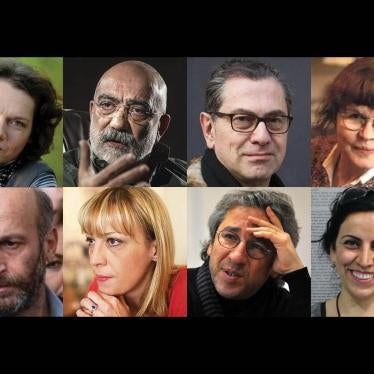The NATO-led Kosovo Force and U.N. international police failed catastrophically to protect minorities during the widespread rioting in Kosovo in March, Human Rights Watch said today in the first detailed report on the attacks.
The 66-page report, “Failure to Protect: Anti-Minority Violence in Kosovo, March 2004,” documents the widespread attacks against Serbs, Roma, Ashkali (Albanian-speaking Roma) and other minorities that took place in Kosovo on March 17-18. Human Rights Watch details the near-complete collapse during the crisis of Kosovo’s security institutions—the NATO-led Kosovo Force (KFOR), international civilian police from the U.N. Interim Administration Mission to Kosovo (UNMIK), and the locally-recruited Kosovo Police Service (KPS). Based on numerous interviews with minority victims and security officials, the report provides a detailed—and previously unavailable—account of what happened in dozens of communities during the riots.
“This was the biggest security test for NATO and the United Nations in Kosovo since 1999, when minorities were forced from their homes as the international community looked on,” said Rachel Denber, acting executive director of Human Rights Watch’s Europe and Central Asia Division. “But they failed the test. In too many cases, NATO peacekeepers locked the gates to their bases, and watched as Serb homes burned.”
On March 17, at least 33 riots broke out in Kosovo over a 48-hour period, involving an estimated 51,000 protesters. Nineteen people died during the violence. At least 550 homes and 27 Orthodox churches and monasteries were burned, and approximately 4,100 persons from minority communities were displaced from their homes.
Human Rights Watch research found that ethnic Albanian crowds acted with ferocious efficiency to rid many areas in Kosovo of all remaining vestiges of a Serb presence, and also targeted other minority communities, including Roma and Ashkali. In many of the villages affected by the violence, in attacks both spontaneous and organized, every single Serb, Roma or Ashkali home was destroyed.
In the village of Svinjare, all 137 Serb homes were burned, but neighboring ethnic Albanian homes were left untouched. In nearby Vucitrn, all 69 Ashkali homes were destroyed, while in Kosovo Polje, more than 100 Serb and Roma homes were burned, as was the post office, the Serbian school and the Serbian hospital. Even the tiniest Serb presences became targets: in Djakovica ethnic Albanians besieged the Serbian Orthodox Church that housed the town’s remaining Serbs, five elderly women. The women had to be evacuated.
Although NATO-led KFOR troops and UNMIK international civilian police are specifically mandated to provide security for minorities in Kosovo, they both failed to protect minorities during the rioting, often leaving besieged Serbs and others at the mercy of large ethnic Albanian crowds for hours before responding. In Svinjare, a large ethnic Albanian crowd walked right past the main French KFOR base on its way to the village, before burning every minority home. KFOR failed to come to the assistance of the Serbs, even though Svinjare is located just a few hundred meters from the base. French KFOR similarly failed to respond to the anti-Ashkali rioting in Vucitrn, even though the village is located near two French KFOR bases.
German-led KFOR troops in Prizren failed to deploy to protect the Serb population and its historic Serbian Orthodox churches and monasteries, despite repeated calls for assistance from German UNMIK police officers based in the town. The village of Belo Polje, adjacent to the main Italian KFOR base, was burned to the ground. In the capital Pristina, Serbs were forced to barricade themselves into their apartments, while ethnic Albanian rioters shot at them and looted and burned the apartments below. It took six hours before KFOR and UNMIK came to their assistance.
The violence was sparked by a series of events, notably sensational and ultimately inaccurate reports that Serbs were responsible for the drowning of three ethnic Albanian boys. Other catalysts included anger among ethnic Albanians over the blocking of the main Pristina-Skopje road by Serb villagers to protest the shooting of a Serb teenager by unknown assailants, and a March 16 demonstration organized by groups of veterans and others linked to the disbanded Kosovo Liberation Army who protested the arrest of former KLA leaders on war crimes charges.
“The violence should be a wake-up call to NATO and the United Nations,” said Denber. “Rhetoric alone can’t protect minority communities or help create a multiethnic Kosovo. What’s needed here is genuine reform of the international security structures.”
Human Rights Watch called for a full, independent review of the response of KFOR, UNMIK police and KPS to the violence. The report also recommends riot-control training and equipment for KFOR and UNMIK police, and a more centralized command structure for KFOR.






